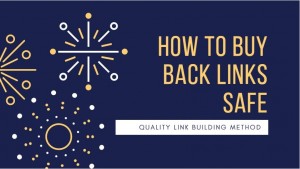You want to buy high quality backlinks to improve your keyword rankings? Here’s the real advices that may help you choose the right provider who brings trustful safe backlinks to you
1. Timing.
According to the experts I asked, if you’re just starting out in link building for a new site, going after paid links is definitely not a good strategy. Before you even think of buying links, you need to have (a) a link profile with quality backlinks that you’ve built yourself or that have built up naturally over time; (b) a clear understanding of your niche and competitors from the SEO perspective.
2. Pace.
Most SEOs I spoke to made it clear that they are very careful about the links they buy, and never purchase the links in a rush or in bulk. That means that you should never aim to buy links fast; first, a sudden influx of backlinks likely won’t look very natural in your profile; second, you ought to analyze prospective backlink in-depth before you pay for them (more on that later). Many of the SEOs said they have a schedule for their paid links that they stick to. For a new site, they usually start with a handful (up to 5) links in the first month, and gradually increment the number over the next months.
3. Quantity.
According to the experts, paid link building should never be used as the primary (let alone, the only) method of link building. When asked about the ratio of paid links in a link profile that they considered to be safe, the experts named values ranging from 10% to 25%. This means the majority of your links need to be built through relationships or acquired naturally. This can help you maintain a healthy-looking link profile overall.
4. Quality.
As I mentioned earlier, all of the people I spoke to emphasized the importance of careful quality analysis before going after a backlink. Here are some of the most important things to check, both on the page and domain level (if the page you’re looking to get a link from a page that isn’t live — say, it’s a possibility of a sponsored post on a blog — evaluate things on the domain level then).
- Indexation in Google. You can find out if a site you’re looking to get a link from by running a search for site:domain.com in Google (replace “domain.com” with the URL of the domain you’re analyzing).
- Page and domain PageRank. Looking at a site’s PageRank is extremely in two ways: first, it lets you assess the link juice the link will pass (and the potential effect it’ll have on your rankings); second, a low PageRank will often mean that the link is spammy or low quality, so you should avoid it altogether. Google’s discontinued the public version of PageRank a while ago, but there are a few solid replacements available.
- Domain history. WhoIs Domain Lookup is a powerful tool for evaluating a number of useful stats on the domain you’re looking to get a link from (and it’s free, too). Particularly, pay attention to Dates (be careful with newer domains), IP Address (if the number of sites hosted on the same server is over 30, you might be dealing with a PBN or link farm; if it’s in the hundreds, you almost definitely are), and Registrar History (look out for drops or very recent changes — these may imply someone just acquired a decent domain, which can often lead to an impending drop in quality).
- Alexa Rank. Alexa isn’t perfect, but it’s perhaps the best estimation of a site’s traffic we have available. Many of the SEOs I spoke with suggested that a site you’re getting a link from must have some real traffic, so do look up their Alexa Rank and make sure it’s not below the average range in your industry.
- Social signals. While social signals shouldn’t be the decisive factor in the evaluation, it’s a handy way to see if the page is alive and kicking and has some real engagement going on.
5. Relevance
Every one of the experts I asked stressed that relevance is key. They always make sure they get links from websites that are related to their niche. This applies to the entire website, not just the backlink page.
6. Anchor text.
4 of the experts I asked replied that if they want to use your target keyword in the anchor text at all, they try to keep it to a minimum (up to 10%). The other 4 said they wouldn’t recommend using target keywords in the anchor text at all. Unanimously, the SEOs said that the anchor text across paid links should be as diverse as it’s reasonably possible. Branded anchors are perhaps the most common type of anchor text they use.
7. Link placement
A few replies I got also mentioned the text before/after the link. Their suggestion was that this text should be closely related to your niche, and may feature target keyword phrases.
8. Management
Lastly (and this applies to all kinds of links you build), managing your backlinks is perhaps just as important as acquiring them. Scheduling monthly link checks is a good start. Such checks typically involve making sure that:
- the backlink page’s quality and authority metrics have not dropped;
- the page is still live;
- the link is found on the backlink page;
- the link has not been switched to nofollow;
- the link’s anchor text has not been changed.
___________________________________________________________________________________________
We provide the best quality backlinks as ever, pls contact us qualitybacklink.net@gmail.com ; Skype: qualitybacklink







